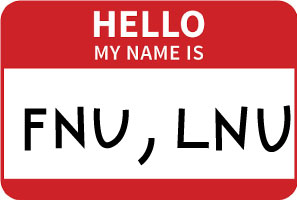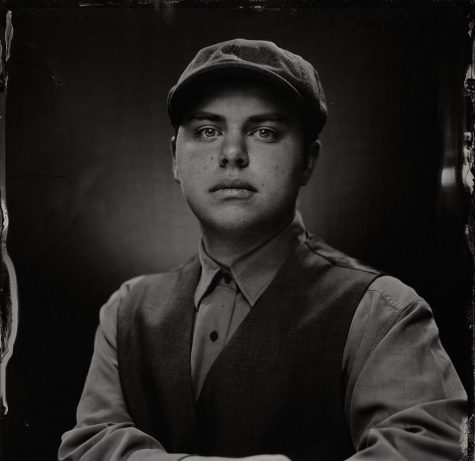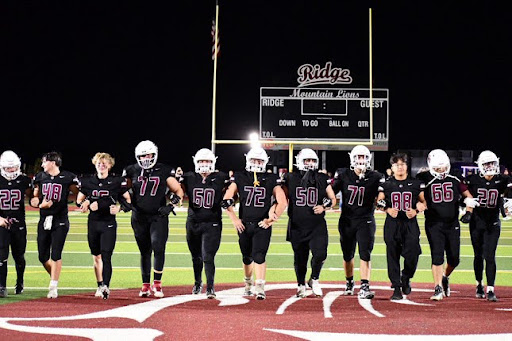Last Name Unknown

September 9, 2022
Did you know that there are potentially millions of people in the world who don’t have a last name? In many countries, last names aren’t common and are based on the name of the father of the family, or even the city they live in. In many cases, unknown last names are mistakes, or intentional.
In the U.S, it is not inherently illegal to have a last name. For example, you won’t be arrested if you don’t have a last name. However, you won’t be able to legally identify yourself. This means that U.S passports, ID’s, and other forms of identification are invalid without a last name. So what happens when a family immigrates or becomes an expat to the U.S? Do they need to come up with a last name and change their identification papers? Or do they have to go through a very specific process?
In my investigations, I was able to meet and interview two students here at MRHS that legally don’t have a last name. The first student that I interviewed was a sophomore named Pushkar. Pushkar was born in India and during his birth, his mother was knocked out because Pushkar was a difficult delivery. His father also couldn’t be present because of his job. Because of this, Pushkar’s mother requested that his grandfather write his name on his birth certificate. However, his grandfather only wrote “Pushkar” instead of the intended name, “Pushkar Joshi”.
At first, this wasn’t really a big deal. However, when Pushkar’s family began to immigrate to the U.S, Pushkar, who was four years old, was unable to travel because the U.S embassy in Chennai, India said he didn’t have a legal last name. To fix this, his mother, grandfather, and lawyer uncle were able to get his passports and legal documents fixed.
Upon entering the U.S, Puskar still didn’t have a legal last name and went by LNU (Last Name Unknown). While in California, Pushkar couldn’t enter the school system because of his LNU status. To fix this, the assistant principal of his school filed his name as “Pushkar, Pushkar”. Pushkar recalls that he didn’t really explain his double first name as much until when his teacher called for role. After his name was called, everyone wanted to know why he was called Pushkar, Pushkar. Thus he would retell his story over and over to his classmates.
“I remember one day the teacher called role and my teacher said, ‘Pushkar, Pushkar? Am I reading this right?’ and that was the beginning of it.” Explained Pushkar.
When Pushkar arrived in Arizona, the same process happened again. This time, the introduction of ID cards only exacerbated the amount of times he had to retell his story.
As of today, Pushkar may not have a legal last name, but he likes to refer to himself as Pushkar Joshi. When I asked him about what he would have to do in the future when he has to get a job or want to apply for something, he explained that the process may be difficult and that he may have to get his last name changed to Joshi. The usual process of a name change requires sending a petition to a local court and having an attorney to inform about state policies and how the process can run smoothly.
“The plan is before I go to college, I hope to legally change my last name from LNU to Joshi. So that when I get to college, my name would be Pushkar Joshi so that it’s rectified.” Said Pushkar.
Another student I interviewed, Bhavana, is also another student that has LNU as their last name. According to her, last names in India are not really a common thing. And, many kids living in India, in fact, do not know that it is important to have a last name here in the U.S. In India, it is also common for the father’s name to be the last name. During her life, Bhavana has had many challenges with her LNU.
“My LNU has affected my life in different ways. I would have trouble registering for things because my name on my Green card wouldn’t be the same as my passport name,” Bhavana commented.
Although her legal last name is LNU, she doesn’t like to be referred to as LNU. In fact, many people have confused her LNU as her actual last name or a nickname. This even happens at doctor appointments, dentist appointments, and other medical appointments. However, her family, friends, and her teachers don’t refer to her as LNU, instead they only refer to her by her first name.
“I do not call myself LNU because it isn’t my real last name. I would rather be called my family’s last name [Vallabha],” Bhavana added.
Having no last name is difficult to have in the U.S, but in other nations around the world, last names are not that common, or aren’t even considered for use. Pushkar wants people to remember that there’s nothing wrong or abnormal just because he and others don’t have a last name.
“A last name is not a defining characteristic of a person. We should all be able to respect that.” Said Pushkar.





